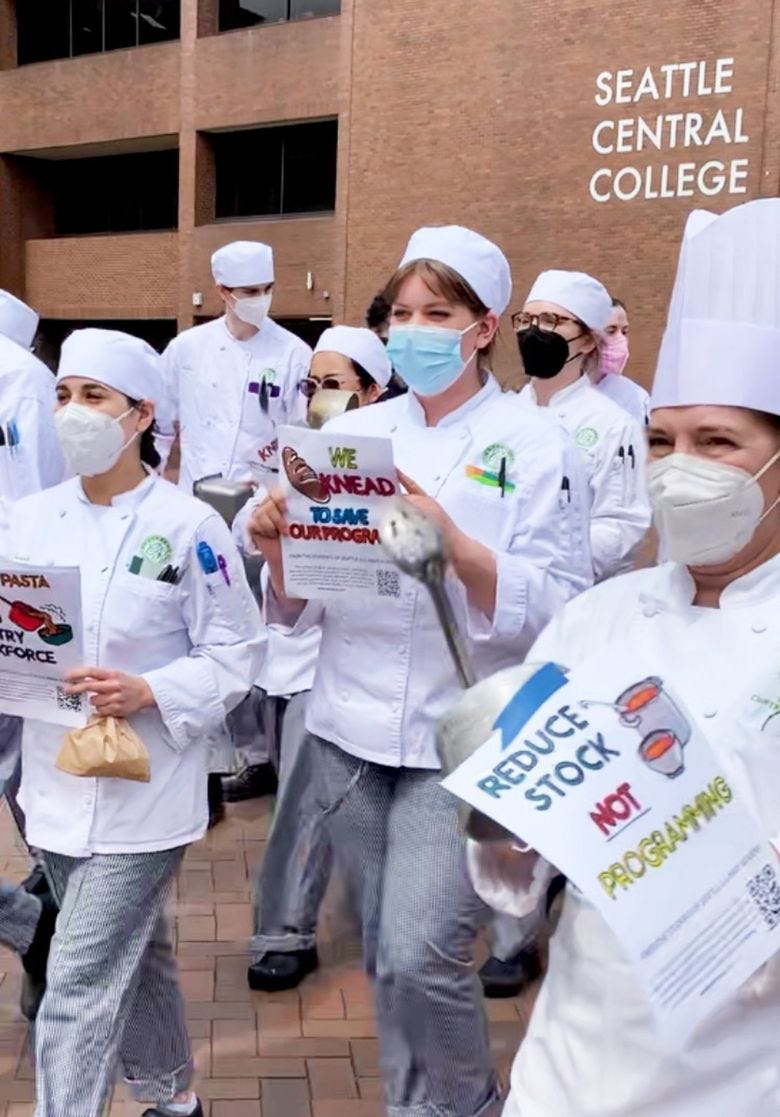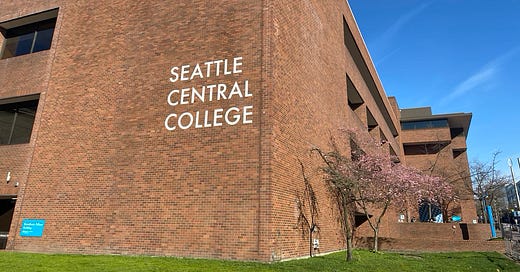Something that you may or may not know—and I’m going to guess it’s the latter—is that the student-run cafe in the lobby of Seattle Central College, The Buzz, might have the best desserts in the city. Every day I come into work I am taunted by a glass case full of stuff that looks like it was done on The Great British Bake Off; on many of those days, I am powerless to resist getting something during my break.
Policies and procedures have necessarily changed everywhere in these uncertain times and now you need a staff or student ID to get into our main campus building, where The Buzz resides. Because of this you may have to take my word for it, unless we know each other and you want to get swiped in during a school day.
Something that you probably do know is that the relentless maw of this capitalist world has little to no concern for the quality of a product or the belovedness of an institution, if the margins are seen to be too small, or if there’s a chance that axing one thing might boost profits elsewhere.
So it was that faculty at our college got an email a few weeks ago that the school’s culinary program, which not only runs and produces the food for The Buzz but has also put some world-class chefs out into the Seattle restaurant scene, was on the chopping block, alongside the apparel design program. Probable cuts to the maritime and wood technology programs were also announced.
It is no secret that the Seattle Colleges have had some trouble balancing the budget recently. Faculty have fought for raises for years to no avail; the district has cried poverty—citing declining enrollments and a loss of international students’ tuition revenue during the pandemic—while it continues to create six-figure-salaried administrator positions even as it slashes and consolidates programs. (Our lame duck chancellor, soon to leave for greener pastures at another college, currently makes $320,000 a year, almost twice the salary of our state’s governor.)
But the thing about community colleges is that they weren’t meant to line people’s pockets or create massive profit windfalls. They were meant to benefit, well, the community. There has been a steady erosion of this idea during my time in the district, which has poured money into rebranding campaigns, public-private partnerships, and the aforementioned roster of administrators; meanwhile, neither students nor faculty can actually afford to live in Capitol Hill, the neighborhood where Seattle Central is located.
The district is not unique in this respect. My specific ire is very real, but it is also muted, folded as it is into the more general ire I have toward the system that demands and incentivizes this behavior. I could fill several emails opining about the crises wrought by America’s neoliberal turn, a wildly successful decades-long project to streamline, privatize, and financialize anything that used to be a public good.
I could do that. But in this case, I actually have some good news. And just as importantly, that good news contains something like a recipe, one that folks can try elsewhere, making adjustments based on needs and taste.
The good news is this: for the time being, all four programs have been given a stay of execution, and will be allowed to continue enrolling students for fall quarter. In an email to all faculty, the chancellor announced that “King County and state legislators, business leaders, and potential private funders have leapt into problem-solving mode,” because “internal and external stakeholders1 have come to a clearer realization of the necessity of reimagining and restructuring the funding models for these workforce programs.” As with so many political pronouncements, this of course puts credit in all the wrong places and obfuscates the driving force behind it all: organizing.
When the announcement first came down, the outcry was almost immediate. The all-faculty email listserv blew up with messages of righteous anger; a person in the culinary program I spoke to called it “a fucking joke.” Within hours, that outcry started to take shape, instead of dissipating. Faculty and students from culinary and apparel design wrote petitions that garnered more than 9,000 total signatures. They also wrote templates for faculty and community members who wanted to send letters to the school administration and local elected officials.
The Asian Pacific American Labor Alliance (APALA) issued a petition of their own in solidarity, looping in the local AFL-CIO leadership. The Seattle Restaurant Alliance, boasting board members from some of the city’s most prestigious eateries, contacted the administration to lodge a complaint about the planned closure on behalf of the industry. On May 4, a week to the day after the initial announcement, the students and faculty of the culinary program (joined by some from apparel design) walked out en masse, shutting down The Buzz early and making their presence—and their anger—known by banging on pots and pans brought from the school kitchens. That same day, the college reversed course.

It took a lot of organizing to make this win happen.2 The outcry came first, which is always necessary. But what I find instructive is that it didn’t stop there. Nor did the imaginations of the affected parties end with hoping the administration, and maybe our elected officials, would do the right thing. As Holly Lewis reminds us in The Politics of Everybody,
Because capitalism is a system of moral relations, not a person, static group, or moral agreement, it does not respond to moral arguments or moral outrage. The world’s Scrooges will not bring a pheasant to the world’s Tiny Tims…Capitalism responds only to what interrupts the generation of profit.
The outrage alone did not interrupt the generation of profit, nor the promise of future profit. But when that outrage was channeled into organizing—when that spontaneous expression of anger was sustained and shaped, through thoughtful and collaborative practice, into a real threat—the administration changed its tune and found some money where it had previously insisted there was none.
I don’t want to make more of this than it is. Other institutions, groups, workers, and so on have their own unique circumstances and hurdles. It certainly helped the culinary program’s case that it has existed for 81 years and is something of a beloved community pillar; it is foolish, too, to imagine that a city’s small business owners can be marshalled into defense of just about any other real social good. Both Chancellor Pan and Seattle Central’s interim president Yoshiko Harden are on their way out, meaning they can ultimately concede on this issue without having to navigate its consequences. And if our own faculty union’s current struggle to finalize a wage agreement with the district is any indication, after a promise from Chancellor Pan’s team that they would negotiate raises this year in good faith if we signed last year’s contract without one, the continued existence of these wonderful programs is a temporary reprieve, not a guarantee.
But. For now, the good guys have won. Another class of students will continue their education, a roster of faculty members will keep their jobs, and bums like me will get to keep buying world-class treats at rock-bottom prices. The details here are unique, but the broader lessons are not, and there has never been a more important time for people to realize the power of their collective organization. Ideally those lessons will help us make things better, and if we never get that far, maybe they’ll help us stop things from getting worse.
Thanks, as always, for reading. I’ll talk to you next week.
-Chuck
PS - If you liked what you read here, why not subscribe and get this newsletter delivered to your inbox each week? It’s free and always will be, although there is a voluntary paid subscription option if you’d like to support Tabs Open that way.
This is one of those political buzzwords that makes me black out with rage when I hear it. Like we’re all investors instead of citizens. Yeah I’m holding a stake alright. And I’m taking it straight up to the damn vampire’s castle!
I thought about writing this out as an actual cute little recipe. “Sprinkle liberally with impassioned emails and add letters to the editor to taste.” I got about one line into that version and decided that in good conscience I couldn’t subject you all to it.





I love getting good news! Thanks for that sir!
Amen! Great article. Love the collective organizing to ultimately help the public good.